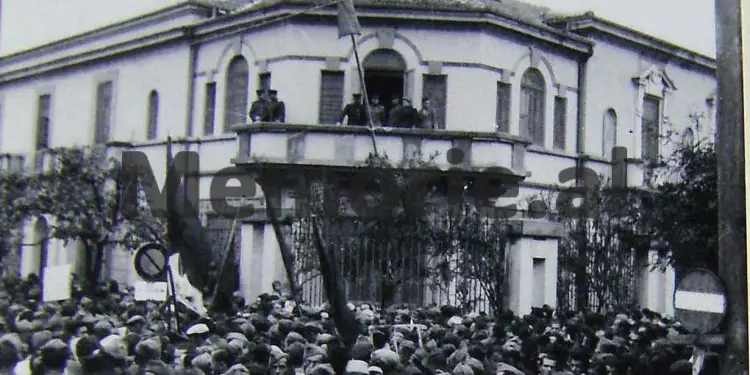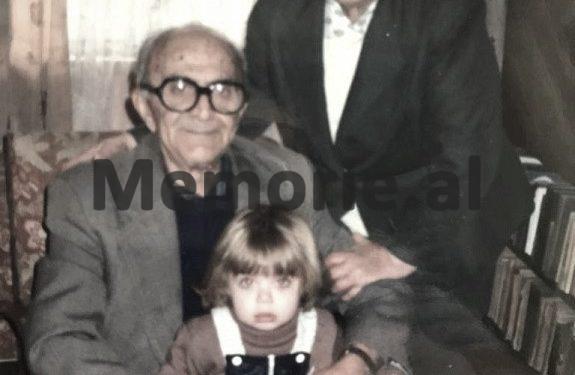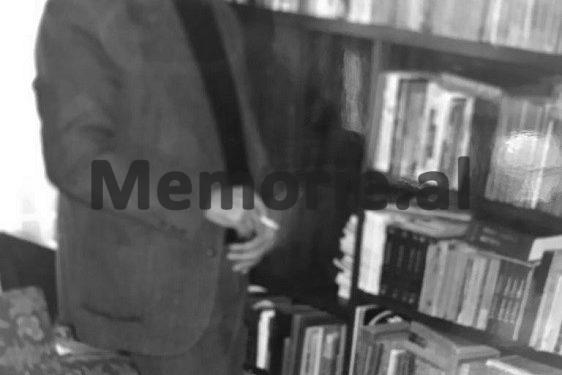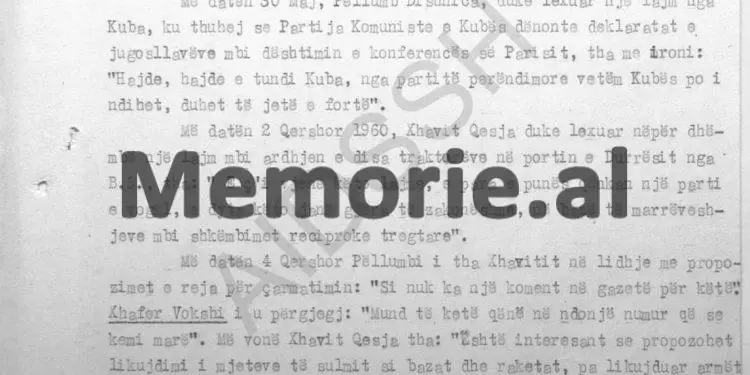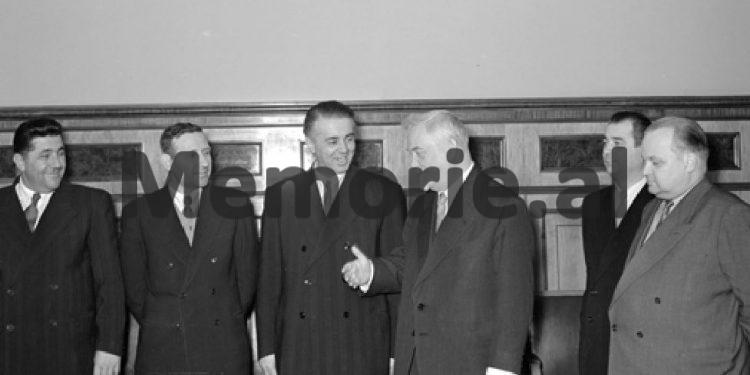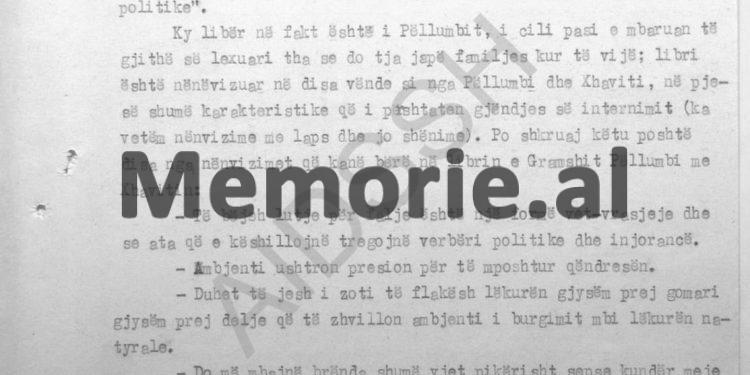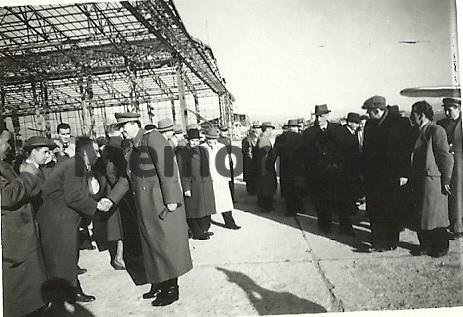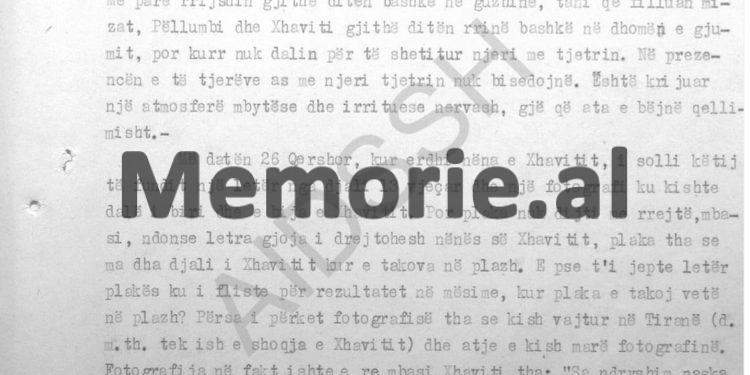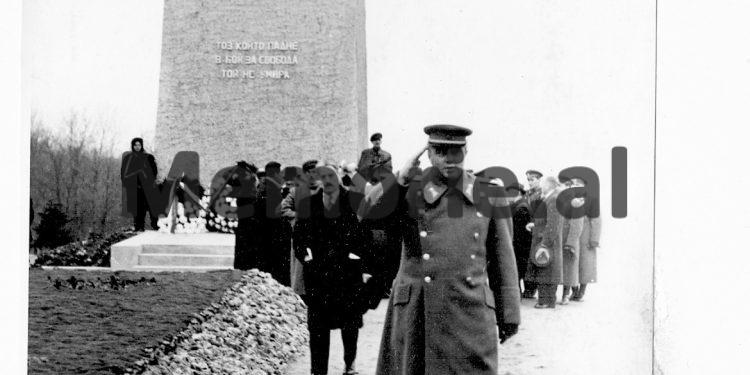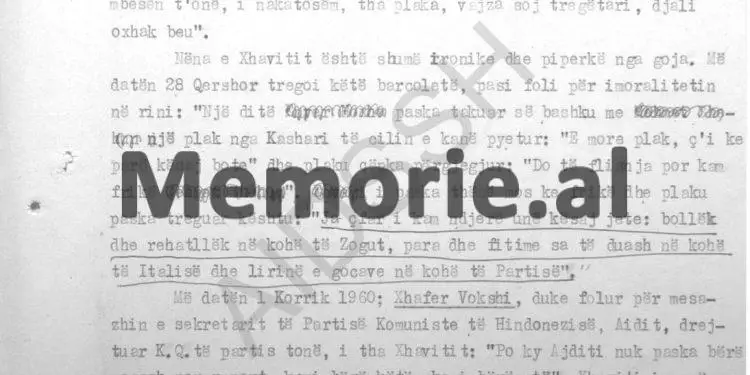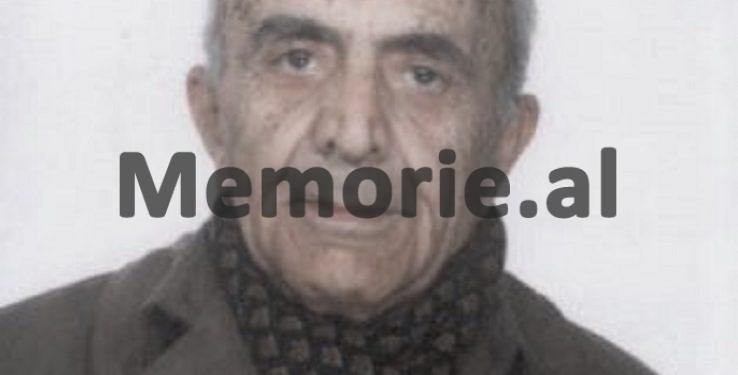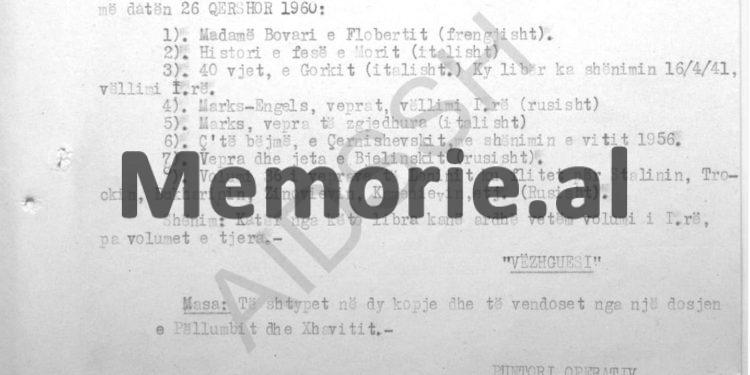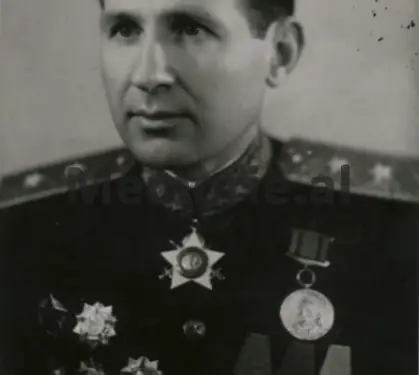Dashnor Kaloçi
Part eighteen
Memorie.al publishes a voluminous archival file issued by the institution of the Authority for Information of Former State Security Files, where there are hundreds of documents with the logo “Top secret” belonging to the former political prisoner, Xhavit Qesja, originally from the city of Kruja, whose family during the period of occupation of the country, 1939-1944, was closely associated with the Anti-Fascist Movement, being one of its main bases and made available all the wealth it had, as Xhavit was one of the first members of the Albanian Communist Party for the Kruja district, leading the Kruja-Ishëm partisan battalion and the 22nd Assault Brigade. Xhavit Qese’s political career after the end of the War, where he was appointed and served in senior positions in the Albanian Army, the apparatus of the Central Committee of the ALP, and several districts of the country, from where he was sent to study in the Soviet Union, where stayed until 1957, when he was announced to return to Albania urgently, after openly expressing his views in favor of the political line being pursued by the main Kremlin leader, Nikita Khrushchev, condemning the Stalin cult. Enver Hoxha’s conversation with Xhavit Qesen in his office in the Central Committee, where he sharply criticized him for the wrong views he had expressed during his studies in Moscow, urging him to reflect and make self-criticism, but Xhavit rejected the suggestion of the first secretary of the Albanian Labor Party, which caused him to no longer be allowed to go to the Soviet Union to complete his studies, but to be sent to work as deputy chairman of the Elbasan Executive Committee, from where a year later, he was expelled from the Party and exiled to Zvërnec Island, where the communist regime kept isolated some of the former senior party and state cadres whom he had condemned for their anti-party views. Xhavit Qesva’s long ordeal and persecution from 1957 to 1990, where he spent a full 32 years in prison and internment, being one of the few convicts in Burrell Prison who went on long hunger strikes in protest of the treatment and savage attitude of the communist regime of Enver Hoxha towards him. The complete form, investigative and judicial file in charge of Xhavit Qeses, which is published for the first time by Memorie.al, which contains the documents of the former State Security that reflect the prosecution and wiretapping against him, the reports of Security collaborators with pseudonyms their correspondence with the letters he sent to the highest party and state instances, as well as the highest leaders of the ALP, until 1991 when he was released from prison!
Continued from the previous issue
Report-information of the State Security officer, Captain Maliq Mersini, with the data of the Security collaborator with the nickname “Observer”, regarding the conversations of the internees on the Island of Zvërnec
Given by the “Observer”
Taken from Cap. Maliq Mersini
Vlora on 24 / VI / 1960
R E P O R T
On May 26, 1960, Xhavit Qesja, in connection with the discussion of the High-Level Conference in Paris, said: discussion of the Conference”.
Pëllumb Dishnica, added: “In fact, the press is limited to newspaper articles and statements of non-state persons, giving only the position of our socialist countries.”
On May 30, Pellumb Dishnica, reading a news item from Cuba saying that the Communist Party of Cuba condemned the Yugoslav statements on the failure of the Paris Conference, said ironically: “Come on, come on, shake Cuba, only Western parties “Cuba is feeling it, it has to be strong.”
On June 2, 1960, Xhavit Qesja, reading through his teeth a news item about the arrival of some tractors in the port of Durrës from the Soviet Union, said: these are common things, based on mutual trade agreements”.
On June 4, Pellumbi told Xhaviti about the new disarmament proposals: “How come there is no comment in the newspaper about this”?!
Xhafer Vokshi replied: “It could have been in any number that we received”. Xhavit Qesja later said: “It is interesting that it is proposed to liquidate the means of attack such as bases and missiles, without liquidating atomic weapons.”
On June 5, Xhaviti, reading the news about the visit of a delegation to China, said: “The first time that Liri Belishova herself in a state delegation”!
On June 7, after there was talk of discrediting the Americans, Pellumbi said: “How will they get out of this situation, it is interesting”! On June 10, recalling the recent events in Korea, Pellumbi said: “Why is our Xhanem press silent, why does it not give news”?!
On June 13, both Xhavit and Pellumbi stressed the Japanese Socialist Party’s good stance on recent events.
On June 16, Pellumbi briefly told me a story entitled “The White Leader,” which described how a white American, after being persecuted, became its leader with the Indians and returned to his hometown for revenge and destroyed completely and left no one alive. When telling this vengeful story, he spoke with a furious vengeful passion.
From June 12, Xhavit Qesja, while giving me the book of correspondence of Antonio Gramsci (former Secretary of the Italian Communist Party), told me: Gramsh describes these prayers as a political death “.
This book is actually that of Pigeon, who, after everyone had finished reading it, said he would give it to the family when he came; the book is underlined in some places, such as by Pëllumbi and Xhaviti, in very characteristic parts that fit the situation of internment (it has only pencil underlining and not notes). I am writing here below some of the underlinings they have made in Gramsh’s book, Pëllumbi me Xhavit:
- Praying for forgiveness is a form of suicide and that those who advise it show political blindness and ignorance!
- The environment exerts pressure to defeat resistance.
- You have to be able to throw the skin of half a donkey, half a sheep, to develop the prison environment on the natural skin.
- They will keep me for many years, precisely because they have no evidence against me.
- Fear of death makes prisoners servile, makes them submissive.
- Uncertainty and uncertainty about what might seem like by people who are not our guards.
- I do not like others to feel sorry for me and comfort me, I was a warrior who was unlucky in the immediate war and warriors should not mourn when they fight, not because they are tight, but because that is how they wanted them themselves.
- Although the future is still bleak, we must not let go of ourselves.
- We have to stand, to be strong, to try, to become strong. On the other hand what happened was not at all unpredictable.
These are some of the underlinings made in the book by Antonio Gramsh, Pëllumb Dishnica and Xhavit Qesja.
“OBSERVER”
Report-information of the State Security officer, Captain Maliq Mersini, with the data of the Security collaborator with the nickname “Observer”, regarding the conversations of the internees on the Island of Zvërnec
Taken from P.O. Maliq Mersini
Given by B.p. The “observer”
Vlora on 17 / VIII / 1960
R E P O R T
Below I am listing cases of short statements or conversations and my findings. In fact no conversation takes place openly; not only political but also ordinary things are not talked about in daily life. Pëllumb Dishnica, and Xhavit Qesja, remains silent all day, just talking to them, answering: “Yes, no, I do not know”, etc., keeping their heads down and gloomy.
They used to stay together all day in the kitchen, now that the flies have started, Pëllumbi and Xhaviti stay together all day in the bedroom, but when they do not go out for a walk with each other. In the presence of others, they do not even talk to each other. A suffocating and irritating atmosphere of nerves is created, which they do deliberately.
On June 26, when Xhavit’s mother came, she brought him a letter from her 13-year-old son and a photo of Xhavit’s son and daughter. But the old woman did not know about the net, because, although the letter is supposedly addressed to Xhavit’s mother, the old woman said that Xhavit’s son gave it to me when I met him on the beach.
Why give a letter to the old woman where she talked about the results in the lessons, when the old woman met her on the beach? Again regarding the photo, he said that he had gone to Tirana (i.e. to Xhavit’s ex-wife) and had taken the photo there. The photo was actually new, as Xhaviti said: “How much change did the girl make in two years”?!
About three months ago, when Xhavit’s old woman was returning from a visit to the island, Xhavit gave him a letter with a list of books, which he showed to the Captain. Exactly those books came to him this time. This time he made another list. As then and so on, he said they are books to buy, (he told his mother to buy them and send them to me). But in fact, the letters were addressed to his ex-wife, Neriban Qeses and here is why:
On the 26th, Xhavit’s old woman said: “I was in Tirana, you have good children, I brought you a cart of books, what they took away to find them, but you did not have a little, but a shelf full of books”!
(So according to Xhavit’s list, the ex-wife searched and found the books they needed and in fact they were sent. All the books have Xhavit’s signature, even the dates of purchase, starting from 1941 to 1956).
Formally, Xhaviti did not correspond with his family or his wife even before they separated. As in all of Xhavit’s relationships, here too we are dealing with a camouflage.
On June 27, Xhavit’s mother told Pëllumbi: “You Pëllumb have many greetings from Rahim Pojani. “He knew that you were here with Xhavit.
Xhavit’s mother is very ironic and peppery. On June 28, he told this joke, after talking about immorality in his youth: “One day, Enver Hoxha met together with Mehmet Shehu, an old woman from Kashari, who was asked: bote ”? And the old man replied: “I would speak, but I am afraid of Mehmet Shehu.” “Enver said: Do not be afraid”, and the old man said: “Here is what I have felt in this life: abundance and comfort in the time of Zog, money and profits as much as you want in the time of Italy and the freedom of girls in Party time ”.
Dated July 1, 1960; Xhafer Vokshi, speaking about the message of the secretary of the Communist Party of Indonesia, Aid, addressed to the Central Committee of our Party, said to Xhavit: “Yes, this Ajdit, did not send a message but a report, we did this, we did that”. Xhaviti replied: “Better concrete things, than big and bombastic words”.
On July 4, Pellumbi told Xhavit: “I have no idea what is happening in Iraq, the press does not give anything on the internal situation”! Xhavit replied: “But what do you have for foreigners from Iraq?”
On July 7, I asked Xhavit because he had underlined with a pencil and ink a quote from Engels from his book “Karl Marx – Frederick Engels” (Selected Works, Volume II), after reading more said, “In vain, by mistake.” This is one of the quotations that refer to the Yugoslavs, about the disappearance of the state and the association of producers with paint).
Here is Engels’ quote: “With the disappearance of the classes, the state will definitely disappear. The society that will organize the production in a new way, based on an association of free and equal producers, will throw the state car where it will have its deserved place: In the Museum of Antiquities “.
At the end of this book, Xhavit wrote with his own hand, this quote from Engels: “History, in the end, will put everything in place, but at that time, I will have gone to that world and I will not to find out anything”!
Below I am listing the books that Xhavit’s mother brought to him on June 26, 1960:
- “Madame Bovary”, by Flaubert (French).
- “History of Religion”, by Morit, (Italian).
- “40 years”, by Gorky (Italian).
- “Marx-Angela”, (Russian).
- “Marx”, selected works (Italian).
- “What to do”, by Chenrishevski, with the note of 1956.
- Bjelinski’s “Work and Life”, (Russian).
- “Volume 36 of Lenin’s works” (Russian).
Note: Four of these books have come in only the first volume, without the other volumes.
The “observer”
Measures: To be printed in copies and placed in the Pëllumbi and Xhavit file. /Memorie.al
Operational Workshop
Koli Sollaku
The next issue follows




